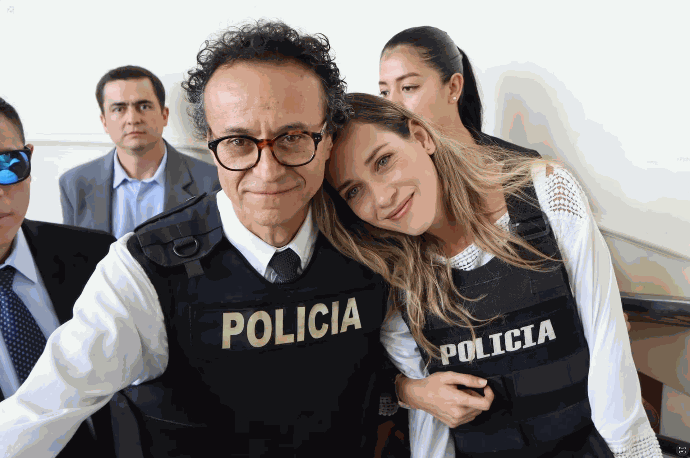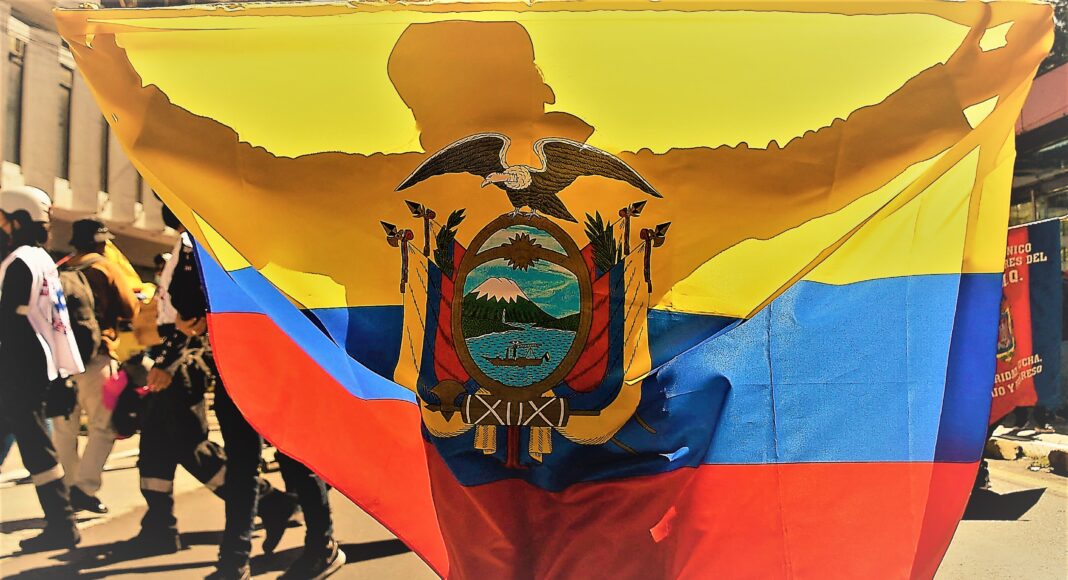It was 9 August, the evening before Ecuador’s independence celebrations, when Fernando Villavicencio was shot in the head three times. As one of eight candidates in the upcoming snap elections, he had been at a campaign rally in Quito. Now, with only days to go until voting on 20 August, Villavicencio’s death casts a long shadow across the polls.
In the last five years, Ecuador has been consumed by drug-related violence and the homicide rate is at a record high. Political researcher Caroline Avila identifies three main priorities for voters: insecurity; unemployment or economic problems; and corruption.
A large proportion of the electorate is torn by indecision. Avila tells LAB that, on 17 July, more than 30 per cent had yet to decide who to vote for. ‘This was due to strong disappointment in the political class’, she says. ‘But now, with Villavicencio’s assassination, the process has become highly emotional, further slowing decision-making’.
Organised crime and political violence
President Guillermo Lasso decreed three days of national mourning to honour Villavicencio’s memory, as well as a 60-day state of emergency. According to polls, the murdered candidate was expected to be runner-up with 13.2 per cent of the vote, behind Luisa González (26.6 per cent), ally of former president Rafael Correa (2007-2017).
Attitudes endorsing political violence began under Correa and worsened with the mandate of Lenín Moreno (2017-2021). ‘From then on’, says Cuencan anthropologist Andrés Abad, ‘Negotiations with drug traffickers have broken down and the situation has got worse’.
Under Lasso’s government, especially over the last year, Ecuador has experienced an escalation of violence which, according to Andrés Abad, cannot carry on. ‘The country is in shock. It’s like Colombia in the ‘50s. The brutality we’ve seen in the last month is unheard of in Ecuador’, he says, mentioning how the new phase started with the assassination of the mayor of port city Manta on 23 July.
Following Villavicencio’s death, Independence Day celebrations were suspended. ‘It’s a mix of fear, uncertainty, and despair at President Lasso’s inaction’, comments Fernanda Zambrano, from Baños de Agua Santa. ‘States of emergency don’t solve anything [there have been 42 from 2019 to March 2023]. We’re horrified’.
Why is Ecuador suffering a security crisis?
The Ecuadorian right blames a rise in crime on the closing of the US base in Manta. However, research organisation InSight Crime draws links with the Ecuadorian State’s failure to address rising crime, expansion of the cocaine market in Europe, and relations with European drug cartels. Dollarisation of the economy in 2000 is said to have contributed to the rise in power of the cartels in Ecuador, by facilitating illegal payments and money laundering.
In the case of Villavicencio, the candidate was one of the country’s most critical voices against corruption and had received various threats before the shooting.
Political analyst Pedro Donoso, Quito, puts insecurity down to a breakdown in the country’s social structure. ‘A recent survey showed nine out of ten Ecuadorians thought negatively about Ecuador’s situation’, says Donoso. ‘Three out of ten said they didn’t trust the State and one in two didn’t trust their community and everyday circle. This mixture of pessimism and scepticism inevitably leads to violence’, he affirms.
The impact of the assassination
Journalist Christian Zurita has stepped up as substitute presidential candidate to replace Villavicencio. ‘Ecuadorians are very emotional’, says Andrés Abad. ‘This week is crucial and will have a huge impact on the electorate’.


Although former president Rafael Correa isn’t running this time, his Revolución Ciudadana party retains strong support in Ecuador, especially after victory in February’s local elections. Despite this, Andrés Abad says the party will face the biggest setback following Villavicencio’s murder, stating there’s ‘evident rejection’ of Correísmo because of the suspected role of the movement’s followers in the assassination.
Stop Press: a second political assassination in one week with the fatal shooting on 14 August of Pedro Briones, a local leader of Revolución Ciudadana.
‘Before the attack, Correísta candidate Luisa González was closing in on the the 40% threshold in the first round of the elections required to avoid a run-off’, says Andrés Abad. ‘I now think that’s very unlikely and we’ll probably need a second round’, he adds.
Despite the setback, LAB spoke with many Ecuadorians who highlighted Correísmo as benefiting from an effective electoral campaign. ‘Hatred for the current president only increases the Correístas’ popularity’, says Donoso. ‘When Lasso [whose approval rating has slumped to 13.93 per cent] is so radically anti-Correa, it makes Luisa González’s job a lot easier, as people start to wonder if a return to Correísmo would be a positive change’.
Who will take Villavicencio’s votes?
Following Villavicencio’s assassination, analysts expect an increase in votes for Jan Topic, said to be the strongest candidate in promoting a firmer hand against the mafia. ‘He’s an expert in security and an elite soldier who knows how to tackle drug trafficking’, says Jorge Males, Quito. ‘Without security, Ecuador has no hope’.
Others are dubious about Topic and his privatisation policies. ‘Topic launched his candidacy through Twitter’, says Kevin Maldonado, Cuenca. ‘He was still looking for political parties to endorse him, so I don’t think he has the necessary experience’, he adds. ‘I also think he’s very extreme and a bit anti-rights’.
Other options are said to be Otto Sonnenholzner, whose line is not far from those who would have voted for Villavicencio, and Yaku Pérez, who has more backing and therefore a greater possibility of reaching the second round.
‘The situation is complicated, but this coming week the electoral panorama will become clearer’, says Andrés Abad, commenting on the suspension of certain candidates’ campaigns. ‘It’s only temporary and I think they’ll come back a lot stronger’.
New tactics or same old tricks?
Be it well-known candidates like Sonnenholzner, Xavier Hervas, and Yaku Pérez, or new names like Topic, Daniel Noboa, and Bolívar Armijos, most candidates have made the most of the campaign to test out a new public image.
‘They’re trying to attract the youngest voters’, says Julián Cárdenas, Quito, who points out how typically more serious candidates have affected a ‘youthful and cheerful’ personality. ‘They caper around on stage, singing and dancing. We’d never seen anything like this before the last two elections in Ecuador’.
As polling day draws closer, Carmen Macías, Cuenca, thinks candidates will be up to the ‘same old tricks’. ‘Instead of concise proposals, they play dirty against each other’, she says, thinking back to the local elections in February, which she claims were tainted by ‘campaign smearing’.
Macías remembers the case of General Gabela, with a report revealing that several members of Correa’s government knew who had killed the General. ‘Opponents will probably use it to discredit Luisa González’s campaign and I don’t think that’s fair’, says Macías. ‘The same goes for Yaku Pérez and those who say he’s not truly indigenous, or for Sonnenholzner regarding his relations with Moreno’.
Donoso believes seven out of the eight candidates are ‘wasting time’ by not building a strong identity. ‘Revolución Ciudadana is the only party which has a true sense of self’, he says. ‘Candidates fail to understand that, with a weak ideology and by only addressing security, they won’t capture the hearts of the electorate’.
What else are Ecuadorians worried about?
Certain voters like Diana Guamán, Salinas, struggle to relate to any of the parties. ‘I’m scared the winner will be consumed by the animosity and resentment of the opposition’, she says. ‘They’ll only react to get even with their rivals and leave us Ecuadorian people behind – just as in previous years’.
In some cases, Ecuadorians are more concerned by problems with the National Assembly, than with the presidency, says Cárdenas. Ecuador’s constitution provides for muerte cruzada whereby the President can dissolve the national assembly and trigger new elections when s/he is threatened with impeachment, as happened in May this year. ‘What worries me’, continues Cárdenas, is that sitting Assembly members, who make up almost half of the candidates, will retain their seats and prevent current projects from advancing’.
Other voters told LAB they feared electoral fraud or the potential delay due to a second round. Zambrano says she is worried about a state that allows citizens the right to bear arms, and the possible formation of paramilitary groups. ‘That kind of thing has already happened in other countries with more right-wing policies like Colombia [prior to its current presidency], which doesn’t have a positive or safe model for us here in Ecuador’, she warns.
Ecuador’s migration crisis
With the highest level of illegal migration to the US in South America, Ecuador exceeds the rates for both Haiti and Venezuela. ‘It’s not just about insecurity. Ecuadorians are leaving to find suitable work’, says Cárdenas.
‘We earn so little and don’t even get to keep our money. That’s what people can’t stand’, he says, explaining how business owners can’t afford to keep losing profits to extortionists. The muerte cruzada, however, is not generally seen as a solution to migration. ‘It only makes us look weak on the international stage’, Cárdenas laments.
Many Ecuadorian voters who spoke to LAB considered the candidates’ proposals unhelpful. ‘All of them lay out what the problems are,’ says Cárdenas, ‘But nobody tells us how their policies will materialise or who’s going to pay for them’.
A new constitution?
As part of her campaign, Luisa González proposes to replace the 2008 Constitution. Although not a major priority for the Ecuadorian electorate, rival vice-presidential candidate Verónica Abad (no relation of Andrés) told LAB, ‘A reform could recover our participatory democracy’. She acknowledges, however, that a new constituent process wouldn’t be possible before 2025.
‘In 2008 we changed what was effective for what simply sounded nice and that dragged Ecuador back 15 years’, continues Verónica Abad.
Nevertheless, some believe problems are due to other factors, such as attempts to force a neoliberal strait-jacket onto the national economy. ‘With the shortages Ecuador has’, says Donoso, ‘This is something we simply can’t support’.
‘A new constitution won’t get me a job or secure me a future’, says Cárdenas, who agrees Luisa González’s proposal is unfeasible. ‘It’s just a vague idea to suck voters in’, he sighs.
What does Ecuador’s future hold?
Voters now face three options. A return to Correísmo, which significantly reduced poverty but crushed dissent and is embodied by Luisa González and Revolución Ciudadana. A continuation of Lasso’s neoliberal policies, which have increased violence and inequality – represented by Topic who is mainly backed by the Partido Social Cristiano and two other centre-right parties. Alternatively they could take a new turn to the indigenous environmentalism promoted by Pérez’s Claro Que Se Puede party.
‘I want an Ecuador that lives off its beauty and tourism – biodiversity, fresh fruit and vegetables, orchids – not exploiting oil and minerals’, laments Zambrano. ‘Most of all, I miss the safety of my country eight years ago, when you could go out without a problem’.
As she continues campaigning, Verónica Abad highlights Ecuador’s natural wealth and hopes the country can promote its rich culture to the rest of the world. ‘These elections are a step closer to love of service instead of thirst for power’, she says hopefully.
Main image: Liberación.cl ‘The Muerte Cruzada is breaking Ecuador’.

